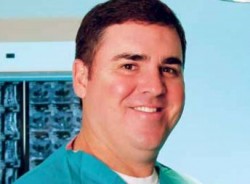Robert McMyne, Jr., M.D.
Removing Patients’ Pain
 During his pain management fellowship, Robert McMyne, Jr., M.D., saw a 90-year-old woman in agony, confined to a wheelchair because of a back fracture. Immediately following kyphoplasty — a treatment in which an inserted instrument helps expand a collapsed vertebrae and a cement-like material stabilizes the bone — the woman walked out of the hospital on her own.
During his pain management fellowship, Robert McMyne, Jr., M.D., saw a 90-year-old woman in agony, confined to a wheelchair because of a back fracture. Immediately following kyphoplasty — a treatment in which an inserted instrument helps expand a collapsed vertebrae and a cement-like material stabilizes the bone — the woman walked out of the hospital on her own.
That case solidified his career track. “All I could think was that if we can help people so much in this field, if we can take away their pain, then this is for me … I love it,” Dr. McMyne says.
There has been so much for him to love in his time at East Jefferson’s Pain Management Institute. He was attracted to the hands-on treatments, the procedural portion of his work, but also to the educational aspects. In his first career, he was a high school chemistry and anatomy teacher, and a baseball and football coach at DeLaSalle, Brother Martin and Holy Cross high schools; he knew even in his own high school days that teaching was a calling. He puts that skill to work with each patient, explaining exactly what is happening to their bodies and what options they have to help with the pain.
“I probably spend more time than the average doctor in my field with each patient,” he says. “I use spine models, map out explanations, let them know what we are doing and why we’re doing it. I feel strongly that a better understanding of one’s pain and the treatment options creates better results.” A recent note from the daughter of a cancer patient with back fractures thanked him for being “extremely compassionate” with her father and “treating him like a person and not a number.”
Another aspect of his work is psychological support. The feedback loop from the source of the pain to the brain creates a vicious cycle, he says. Pain management physicians walk a fine line between helping patients cope and recommending a psychologist or psychiatrist to follow up on pain. “A lot of it is giving them hope and helping them come up with reasonable expectations for their pain,” he says. “I would love to get all my patients pain free, but sometimes a 50 percent reduction and improved function can be deemed a success. It’s a huge part of what we do.”
As such, he teaches pain-coping mechanisms and recommends meditation or prayer if patients are religious. Physical therapy often helps. And just having a good social support system makes all the difference. A senior citizen wellness program has been a godsend for many of his elderly patients to be with people experiencing similar situations.
As the population ages and life expectancy lengthens, Dr. McMyne says he is doing more kyphoplasties and vertebral augmentation for fractures of the spine. Advancing technology in neuromodulation targets areas for electrical stimulation and can alter painful nerve activity.
“Osteoporosis is detected earlier because of better technology and better healthcare in general,” he says. “That makes the pain associated with these fractures more amenable to these procedures.”
Younger patients are also making more use of pain management. “Kids today are getting bigger, faster, stronger,” he says. “I still coach, and, compared to where I was 20 years ago, it’s crazy.” He anticipates that the strain from repetitive impacts will lead to a lot more advanced arthritis in the future. Nonetheless, he feels that the benefits of sports greatly outweigh risks, and, in his spare time, he coaches his four sons’ sports teams and runs the New Orleans Jesters Youth Baseball program.)
Dr. McMyne finds it gratifying to use simple and non-invasive solutions for pain and says that a good pain management evaluation ahead of surgery can sometimes save time and money, and save the patient from a much more complex procedure.
“Years ago, I had a back injury playing high school football,” he says. “I had three epidural injections. It was like magic, and, knock on wood, I was better. I didn’t realize at the time that it was pain management.”
Robert McMyne, Jr., M.D.
East Jefferson Pain Management Institute
4300 Houma Blvd., Ste. 105
Metairie, LA 70006
(504) 503-4109
Medical School: LSU
Residency: Physical Medicine and Rehabilitation, LSU (Fourth Year Chief Resident)
Fellowship: Pain Medicine, LSU
Board Certifications: Physical Medicine and Rehabilitation, Pain Medicine
The Pain Management Institute at East Jefferson offers a multidisciplinary patient-centered approach to the treatment of chronic pain, including surgical and non-surgical pain solutions such as physical therapy, cognitive therapy, medications and injections.
